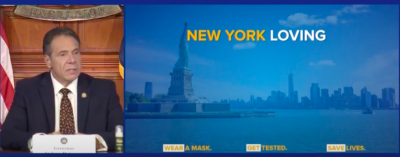What Can Americans Learn from New York’s Shrewd Governor, Andrew Cuomo? Managing Covid-19

Day 240 of the Covid-19 pandemic in the US; anxious New Yorkers are again invited to hear about changing conditions in their state and what the governor’s doing to protect them. Monday’s press briefing must be his 150th review of the stubborn unsettling disease.
Cuomo’s updates are a cleverly woven tapestry: political analysis, admonishments, comprehensive statistical reports, warnings, evasions of reporters’ questions, and affirmations of his administration’s successes are touched up with a personal anecdote and an attempt at humor. These briefings deserve attention not because they’re contrived to pave his way to any future bid for the White House, but as an effective and (on the whole) exemplary management of the terrifying and still uncontrollable pandemic.
Cuomo’s homilies these past months are worth some critical attention from scholars of rhetoric. These discourses are also valuable in how they contrast with statements by other politicians, incumbents and challengers in the coming election, that saturate our media.
Like Cuomo’s press conferences during the scary, hard months of spring and summer, Monday’s briefing was, admittedly, a kind of speech— a combination of legal acumen, moral appeal, politics and emotion. By and large it works. I think that’s because like most Americans, I’ve been stressed and confused by this raging disease charging among us along an unknown path, and we are all in search for some calming, practical guidance.
I began listening to the governor’s daily reports in March. I asked neighbors for their opinions of Cuomo’s efforts. Whatever their political persuasion, most shared my positive feelings.
Before you admonish us for being uncritical and ignorant of Cuomo’s history, I admit that I agree with the widespread view that he’s shrewd; he evades responsibility for mistakes made and these frequent public appearances may be opportunistic on his part.
That said, I still tuned in to Cuomo’s recent briefing. Besides feeling better informed by this decision, I’m somewhat assured that New Yorkers at least have a chance of negotiating this disease. (Where else can we find hope?) I also grasp and appreciate the pattern of Cuomo’s discourse. It’s in striking contrast to anything proffered by the staggering quantification of the disease’s history in country-by-country comparisons, in daily medical speculations and policy debates or journalists’ analyses. Yes, Cuomo’s briefings are political; yes, he’s showing off; yes, he’s somewhat arrogant; and yes, this could be planned with his eye on a future White House bid.
But you have to give it to him; he has management skills beyond his media appeal, beyond the abilities of Biden or Pelosi, Sanders or Harris to expose the current administration’s incompetence. Cuomo also displays a convincing compassion for our woes; he seems to possess an ability unmatched by others to calm a stressed-out, anchorless American public.
Isn’t it worth trying to understand how he does this?
Cuomo seems to have developed a formula: he mixes a little humor with some outrage; he praises our struggling, essential workers while remembering everyone’s suffering; he analyzes and explains the fundamentals of pandemic management (e.g. his opening-and-closing-the-valve analogy); he presents us with skillfully arrayed, digestible scientific facts.
He regularly appeals to our patriotism and our intelligence—“Don’t underestimate the American people”, he repeats, even declaring America is the greatest country, (with New Yorkers the smartest of all!), and ends by running the gambit of strident questions from reporters. It’s brilliant, you have to admit.
By now you’re ready to chastise my editor for allowing a writer to praise any American politician.
Hold on; these commendations do not exclude my recognition of Cuomo’s misdemeanors and crimes. There’s plenty of muck to throw at the governor—e.g. the dreadful mishandling of nursing home placements in the early days of Covid-19’s crisis. Look how he evades Trevor Noah’s persistent charges— an artful lawyer through and through.
If we can put aside Cuomo’s serious mistakes and political ambitions, allow me to proceed with his general Covid management strategy, and to analyze his formulaic approach to dealing with a stressed, jittery population that includes the nation’s financial center and nine million people residing in our largest city– an unparalleled virus hotspot with over 700 deaths daily– confined to their apartments, with businesses shuttered, medical prognosis unknown, inadequate hospital beds, and tepid federal help.
Mercifully, New York was able to contain the threat. Day by day, it flattened the curve, remarkable by any standard, with the governor’s office temporarily healing its rift with New York City’s mayor.
Today we’re again facing rising infections and continued economic uncertainty; the entire population still needs assurance and guidance, something we used to call ‘leadership’. To whom can we look?
Take Monday’s press briefing as an example of a well-orchestrated address to a nervous public: Cuomo began with a bold yet measured attack on the White House’s announcement that it has no policy to control the pandemic; it would await the vaccine and its associated therapeutics. Cuomo’s response was unrestrained: the federal government’s policy is preemptive capitulation, totally irresponsible. Instead of reviewing the president’s shortcomings, diversions and false claims, Cuomo directs his critique to New York’s past success and how he proposes to move ahead: “Why (did it work)? God didn’t intervene. We controlled the spread. Ask yourself? How did NY reduce the infection rate, if you (Washington) say we can’t control? We did it. You can’t eliminate it, but you can control it”. He then reminds us of his can-do-it alternatives: the valve management system already in place and the new microcluster control he’s introduced. Surely this practical, non-political we-can-do attitude is what we desperately need. (Remember Obama’s winning Yes, we can?)
Cuomo never forgets to affirm how great America is and how New York is first within America. He boasts, not unreasonably, how his state did it; “We flattened the curve. We went to the top of the mountain and down again”, all the time praising the critical agents—the people. “We could not impose rules of mask-wearing, social-distancing, quarantining. You did it. You were disciplined, smart, and you cared for others as well as yourself”.
His boasts are reinforced with an appeal to New Yorkers’ smartness, toughness, and compassion for one another– on the edge only a few months back, in the belly of the beast, with the highest rate of infection, hospitalization and death in the country (if not globally). Cuomo’s chauvinistic New Yorker attitude goes unquestioned–because it works. He knows that like himself, New Yorkers are somewhat arrogant, a little overconfident, and the smartest of the smart (sic).
He tactfully follows his affirmation of the US as the greatest country in the world, asking: “How could this happen to us; our infections are increasing at higher rate than countries like Mexico, Mexico, with 44 per million infections in the past week; Canada with 68, Japan with 4, compared to our 208?”
A little bit of patriotism with some shame can be effective, especially when augmented by comprehensible, convincing empirical facts. This shared pride furtively combined with empiricism probably accounts in part for Cuomo’s policy successes. He ends every briefing, before talking questions from reporters, on his characteristically high “New York is loving, NY is caring, NY is smart, NY is strong, NY is united”.
Don’t knock someone who moves a stressed, fearful people to believe a little more in themselves at a highly tenuous period in US history.
*
Note to readers: please click the share buttons above or below. Forward this article to your email lists. Crosspost on your blog site, internet forums. etc.
B. Nimri Aziz is an anthropologist and journalist who’s worked in Nepal since 1970, and published widely on peoples of the Himalayas. A new book on Nepali rebel women is forthcoming. She is a frequent contributor to Global Research.
Featured image is a screenshot from a CNBC video
*** This article has been archived for your research. The original version from Global Research can be found here ***


